The Demise of the Soviet Union: The Secret War that Helped Destroy Soviet Socialism, 1981-1991
When the Soviet Union disbanded in 1991, political leaders, journalists and scholars from conservative to liberal said it was due to the inherent failure of socialism. Strobe Talbott, a liberal career diplomat, and expert on the Soviet Union who served as Deputy Secretary of State under Bill Clinton, said after the downfall: "The Soviet Union collapsed: the Cold War ended almost overwhelmingly because of internal contradictions or pressures within the Soviet Union and the Soviet system itself." (Victory: The Reagan Administration's Secret Strategy that hastened the Collapse of the Soviet Union", Peter Schweizer, p. xii, Introduction). Conservative British Prime Minister Margaret Thatcher triumphantly proclaimed, "There is no alternative" to the so-called free market economy of capitalism. The New York Times, December 26, 1991 wrote about the end of the Soviet Union as if it were giving the obituary of a sick elderly person who died of natural causes. "The Soviet state, marked throughout its brief but tumultuous history by great achievement and terrible suffering, died today after a long and painful decline. It was 74 years old."
It is my contention that the Soviet Union didn't collapse on its own in 1991, and it's end had little to do with alleged weaknesses in socialism. The Soviet Union, and especially its economy, was the target of a highly sophisticated secret 10-year campaign of sabotage by US capital, organized and led by die-hard anti-communists in the Reagan Administration under the direction of former CIA director William Casey. Socialism as an economic, political and social system is sound. It was the intense campaign of sabotage by the US, and miscalculations by the top leadership of the Soviet Communist Party that led to the overthrow of socialism in the Soviet Union.
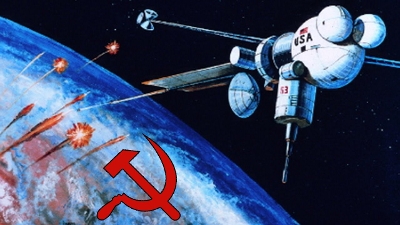
The long history of US anti-communism began with the US government sending troops into Russia in 1918, along with at least 17 other countries to support the counter-revolutionary Russian White Army in an effort to overthrow the young socialist republic. The United Kingdom's Winston Churchill said the military invasion was an effort to "strangle" the socialist baby in its crib. This anti-communist war failed, at a loss of an estimated 1.5 million combatants on both sides, and 5 - 9 million Russian citizens. The attempts by the US government and capitalist elite to undermine and overthrow the Soviet Government continued almost unabated since.
Soviet economy growing
The Reagan Administration greatly ramped up the US government's anti-communist campaign shortly after Reagan assumed the presidency. In May 1981 President Reagan told students at Notre Dame University, "The West will not contain communism, it will transcend it...We'll dismiss it as a sad, bizarre chapter in human history whose last pages are even now being written." (Schweizer, xiii-xiv). Reagan knew more than he was telling. There followed a steady barrage of lies intended to malign the Soviet Union and socialism in the eyes of the American public.
Neither Reagan nor other government leaders told the true hard facts about the Soviet Union and Soviet life. For example, the Soviet Union's Gross Domestic Product (GDP) had grown from $820 million in 1977 to $1.2 trillion in 1980, and kept climbing. Hardly a sign of decay. Studies and individual reports during this period revealed that life was improving for the vast majority of people. Arthur Schlesinger, a noted Harvard University professor, author and leading intellectual who was also an anti-communist, wrote after a 1982 visit to the Soviet Union: "I found more goods in the shops, more food in the markets, more cars on the streets, more of almost everything...Each superpower has economic troubles; neither is on the ropes." (Peter Schweizer, xiv). Reports like these got little or no public exposure.
The growth and development of the Soviet Union was remarkable from the earliest years, yet was largely ignored by the US government and the corporate-owned mass media throughout the history of the Soviet Union. Russia began in 1917 with a wholly underdeveloped economy due to three centuries of stultifying feudalism. Over 80% of the people were poor peasants, most of whom were farming small plots of land. Capitalism and industrialization was in its infancy, and much of the economy was in ruins from WW11 from 1914-1917 and from the Civil War from 1917-21. Rebuilding efforts were slow since feudal society did not train people to build a new industrial society, and the obstacles were great. However, progress was made in the 1920's under these conditions, especially under the New Economic Policy (NEP). But not fast enough. Party leader Stalin told workers assembled at the First Conference of Workers in 1931 that they would have to play an important role in industrializing the Soviet Union. That was the key to getting out of underdevelopment and becoming a strong industrial society. "We are fifty or a hundred years behind the advanced countries," Stalin said. "We must make up this gap in ten years. Either we do it or they will crush us."
In 1941 Nazi Germany invaded the USSR, overtook the Ukraine and threatened Moscow. But the Soviet Union had successfully built up its industry, economy and military in a series of spectacular achievements in ten short years. The Soviet Red Army repelled the Nazi's at Moscow's door, and handed the fascists many hard-fought but stunning defeats over the next four years, bearing the brunt of the war against Hitler's military might. The defeat of the Nazi's and the end of the war can be attributed largely to the Soviet Union and its Red Army. The price was high. The Soviet Union lost 20 million people, and had much of its land, factories, roads, livestock, homes and other buildings destroyed. A new rebuilding process was undertaken again.
In June 1982, Reagan addressed the British Parliament about an economic crisis which "... is happening not in the free, non-Marxist West, but in the home of Marxism-Leninism, the Soviet Union..." (Schweizer, xiv).
Reagan conveniently left out the real story. In 1982 the Soviet Union's GDP rose to $1.5 trillion. Soviet citizens were working - there was virtually no unemployment, and they received free education through college, free health care, and low cost housing, all paid for through a progressive tax structure. Nor did Reagan say anything about the recession griping the US that year, due to the inherent downturns in capitalism that saw 15 million workers out of work.
Reagan: Anti-Communist FBI informant
Ronald Reagan long held an ideological hatred for socialism and communism. It was born during his days in Hollywood as a struggling B grade actor who rode the anti-communist bandwagon during the McCarthy Cold War period to a successful career. He publicly denounced people he believed were socialists and communists in the film industry and the Screen Actors Guild while acting as a secret informant for the FBI. Reagan destroyed the careers of many talented and beloved directors, writers and actors, and was rewarded by being given a job as a pitchman for the General Electric Theater TV show. This gave him economic security for the first time. Reagan used this TV program to build name recognition to enter politics, first in his successful run for Governor of California in the 1960's where he empowered right-wing and racist forces, and later to help his 1980 presidential election victory.
Upon assuming the presidency, Reagan agreed to former CIA Director William Casey's plan to undermine and destroy the Soviet Union through a combination of economic warfare and sabotage, hot and cold war, a punishing arms race, and sophisticated and heated psychological and political warfare.
It is true that there were problems in the Soviet Union, just as there were and are in every other country on earth. They were solvable.
But after four years of secret sabotage of the Soviet economy by the Reagan-Casey team the economic problems worsened, just as the new leader of the Soviet Communist Party, Mikhail Gorbachev, took office. Gorbachev took what appeared to be radical reform steps to reverse the losses and hardships, boost the economy, and improve the quality of life under socialism. One part of this process was to open up public analysis and criticism of past and current shortcomings and wrong-doings. Progress was made in a number of areas. However, by 1987, the increasing public criticisms opened the doors for opponents of the system to assume positions of authority, especially in the mass media, and sow confusion and opposition to socialism. (See Yegor Ligachev, Inside Gorbachev's Kremlin.) Ligachev was a Communist Party leader who worked closely with Gorbachev in the first two years, 1985-86, but became increasingly critical of the failure keep the reform efforts focused on economic development and strengthening socialist political practices and policies. Ligachev and others believed that Gorbachev mistakenly allowed opponents of socialism to occupy leading positions in state organizations, including the media, and they used these positions of power to weaken and cause the ultimate downfall of the Soviet Union and socialism.
Soviet leaders before Gorbachev saw early on what the Reagan Administration was doing. Soviet Party chairman Leonid Brezhnev said in 1981 that the Reagan Administration was committed to "a further expansion of the arms race and...working to undermine the Soviet economy." (Schweizer, Victory, p. 40). Gorbachev was faced with a huge increase in US military build-up and war provocations, and was motivated, first-and foremost, to prevent a nuclear war. While the Soviet economy had closed the large historical gap with the much larger US economy, the Soviet Gross National Product (GNP) was still half of the GNP of the USA in the mid-1980's. There never was parity between the Soviet Union and the United States and the US-promoted idea that there were two "super powers" of more-or-less equal strength, was a myth. Money spent on the Soviet military weighed much more heavily on the overall Soviet economy than the US economy. Gorbachev and other Soviet leaders clearly understood that an all-out war between the US and the Soviet Union would have meant mutual nuclear destruction, and threatened much of life on earth.
Secret plan revealed by anti-communist insider
In 1994, after the Soviet Union ended and socialism was destroyed, a smoking gun appeared in the form of Schweizer's book, Victory. Schweizer was a fellow at the staunchly anti-communist Hoover Institution on War, Revolution and Peace at Stanford University, and a supporter of the Reagan plan.
The Russian Revolution and the Soviet Union was a beacon of hope to millions of exploited and downtrodden people around the world. For the overwhelming majority of its existence, the Soviet Union was the chief aid to national liberation struggles around the world, countries trying to free themselves from colonialism, feudalism, capitalism and imperialism. The Soviet Union also supported the struggles of the working-class in many capitalist countries, and was the most influential socialist country in the world at a time when a growing number of countries were looking to socialism as a solution to many generations of capitalist exploitation. It successes were noted by major US economists. Nobel Laureate Economist Paul Samuelson, who is anti-communist, wrote in his widely used college textbook, Economics, published in 1981, "It is a vulgar mistake to think that most people in Eastern Europe are miserable." John Kenneth Galbraith, noted economist and a reformer of capitalism (but not an advocate of socialism), said in 1984, "The Russian system succeeds because, in contrast to the Western industrial economies, it makes full use of its manpower. The Soviet economy has made great national progress in recent years." (Schweizer, xiv-xv). The gains of the left internationally In the 1960's, 1970's, and early 1980's was a major reason for the Reagan-Casey-capitalist elite to ratchet up its offensive against Soviet socialism, and all progressive forces everywhere.
Casey: Former CIA Director and murderer
Casey and the team he assembled willfully broke laws, violated the decisions of Congress and basic human morality, and planned armed violence against other countries. They had two goals. To defeat progressives and socialists everywhere, and stretch the Soviet Union's support system for these movements and leftist governments to the breaking point. Casey and his team illegally supported and armed the right-wing Contra fascists in Nicaragua in their effort to overthrow the leftist Sandinista government. Casey's team financed and armed right-wing death squad fascists and the right-wing government in El Salvador. The Casey-Reagan team supported the semi-feudal, right-wing, and anti-communist Mujahideen fighters in their effort to overthrow the progressive, socialist-oriented government in Afghanistan, and the Islamic but anti-US capitalist government in Iran, and in other countries around the world.
The Soviet Union was supporting these progressive governments and movements, and increased US attacks required increased Soviet aid in material, food and military support. All of this cost the Soviet economy dearly compared to the much larger US economy.
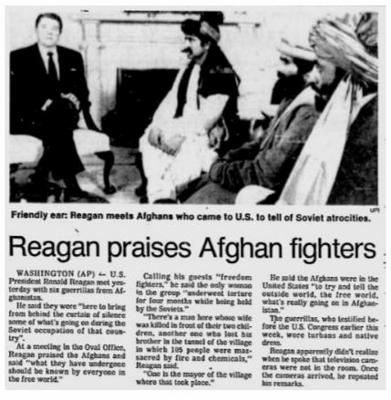
The Casey-Reagan team also organized, planned and funded illegal armed invasions inside the southern Republics of Soviet Union during the 1980's by the US-supported Mujahideen to destabilize the country and encourage more terrorist activities inside the Soviet Union. These Reagan-Casey trained and funded Mujahideen forces fought in Afghanistan in the 1980's, and later formed Al Queda and ISIS, which have committed terrorist crimes against the people of Iraq, other countries in the Middle East, the US, and European countries.
According the Schweizer in Victory, Casey told a meeting of top advisors to Reagan in 1981, in the words of Schweizer, that "we need to be backing these movements with money and muscle...we need a half a dozen Afghanistans" (Schweizer, page 9). Specifically, in Afghanistan, the US goal was to gain control over the profitable pipelines carrying oil and natural gas to oil tankers docked in ports along the Arabian Sea near the entrance to the Persian Gulf from the largest oil and gas reserves on the planet.
Escalating the arms race and nuclear war threat
Reagan also immediately began a huge build up of massive and sophisticated military weapons, including nuclear weapons in the early 1980's, publicly called the Soviet Union an "Evil Empire" on March 8, 1983, and threatened nuclear war with the Soviet Union. This took place while the Soviet Union was making proposals for nuclear disarmament. Reagan told the American people that we had to be ready to win a nuclear war - an oxymoron since the scale of destruction would leave no winner. Reagan brought the next generation of intercontinental ballistic missiles, the MX Missile, to successful completion, padding the bank accounts of his financial donors including the giant military contractors Bechtel, Boeing and McDonald Douglas, with tax payers dollars. Soviet leaders were alarmed. Schweizer wrote: "Hundreds of select meetings were held across the USSR in which 18 million members of the CPSU were briefed about the 'aggressive intentions of the enemy' in October 1983." (Schweizer, page 166.)
Reagan advisor Richard Allen met with Soviet Ambassador Anatoly Dobrynin, and the exchange is in Schweizer's book: "They (the Soviet leaders) thought they had some first-class nut-balls on their hands," Allen explained. "They were frightened to death...It was part of Reagan's strategy to get the Soviets to think he was a little crazy." Schweizer explained that this strategy was proposed by Herman Kahn, "who had compared the superpower competition to a game of chicken. Neither side wanted a crash...but neither wanted to back down...Yet ultimately someone would back down to prevent all-out war. As Kahn so succinctly put it, 'No one wants to play chicken with a madman.'"
In order to further the madman image, the Reagan Administration played military chicken with the Soviet Union, risking accidental nuclear war. Schweizer quoted a general: '"Sometimes we would send bombers over the North Pole, and their (the Soviet Union's) radars would click on," recalls Gen. Jack Chain, the former Strategic Air Command commander. "It really got to them," recalls Dr. William Schneider, under-secretary of state for military assistance and technology..."They didn't know what it all meant. A squadron would fly straight at Soviet airspace, and their radars would light up and units would go on alert. Then at the last minute the squadron would peel off and return home."'
On more than one occasion these war games almost provoked the Soviet Union into launching its nuclear missiles, fearing a real US first strike. In August 1984, during Reagan's re-election campaign, he gave a radio address: "My fellow Americans, I'm pleased to tell you that today I've signed legislation that will outlaw Russia forever. We begin bombing in five minutes." That was supposedly a joke. But the Soviet Union and Eastern European socialist countries didn't think it was funny, especially given the real life bombings and other acts of war that the US committed against Viet Nam, Laos, Cambodia, Cuba, the Philippines, Nicaragua, El Salvador, Greece, Angola, and against Japan in WWII when Hiroshima and Nagasaki were leveled with US nuclear bombs.
Corporate support for economic sabotage
This psychological warfare was one important piece in a larger campaign to unnerve Soviet leaders and undermine and destroy the Soviet economy, and by forcing the Soviet's to spend more on defense. Giant corporations and banks played a special role. At one point in this 10 year operation, Casey was meeting with nearly 200 corporate executives and recruited or placed CIA informants in these corporations. Chase Manhattan Bank was one of many banks and corporations involved. Casey met with leading US business executives, wrote Schweizer, to persuade them not to do business with the Soviet Union. Specifically, he urged US banks to stop making loans to the Soviet Union. The largest and most important economic program for the Soviet Union during that period was the construction of a large natural gas pipeline running 3,600 miles from rich gas fields in northern Siberia to the Soviet-Czech border. The pipeline would carry natural gas for sale through-out Europe and beyond.
The Soviet Union had very large reserves of natural gas and oil, major income producers for its socialist economy. Sophisticated equipment was needed for this project, and several western European companies specialized in producing this equipment. The Soviet Union made a deal to purchase this equipment in exchange for 25 years of natural gas at relatively low guaranteed prices. It would deliver 1.37 trillion cubic feet of natural gas a year to a French, West German, and Italian consortium. The western Europeans jumped at the good business deal, which also reduced their dependence on the more volatile Middle East oil.

Reagan goal: Destroy Soviet pipeline
The Reagan-Casey goal was to destroy this pipeline before it could even be built. One of Casey's key contacts in the business community was Roger Robinson, a vice president of Chase Manhattan Bank, who was in charge of his bank's loans to the Soviet Union and Eastern Europe. Robinson informed Casey just how lucrative the pipeline would be for the Soviet economy. Casey and his team had been studying in detail the Soviet economy and determined that stopping the pipeline would deal the Soviet economy a terrible blow. Casper Weinberger, a former vice president and general counsel at Bechtel Corporation, a major arms manufacturer, was Reagan's Secretary of Defense and urged tough sanctions against the Soviet pipeline.
Casey received a report from the CIA that one of the bottlenecks in the Soviet energy sector was the need for new advanced rotary drills. Schweizer explained: "The Soviets would have to drill deeper in existing wells and through harder rock to sustain production. This would force them to shift from their domestic turbo drills to American rotary drills." Schweizer continued, "The United States had a near monopoly on many of these oil-drilling technologies...If Moscow could be denied access to these technologies, it would cost them billions," Schweizer wrote. And this denied access would shut down a large portion of Soviet oil drilling, and the Soviet economy.
Harming allies to cripple the Soviets
On December 29, 1982, Reagan went on the airwaves to announce to the American people that the US was imposing an embargo on the Soviet Union. This embargo also negatively impacted other countries, including US allies. Schweizer summarized Reagan's remarks and what it meant: "American involvement in the pipeline would be prohibited. The plan affected some sixty US companies but also halted Japanese and Soviet plans to develop oil and gas fields off Sakhalin Island. That arrangement was very similar to the pipeline deal: Japan was financing the project in exchange for guaranteed supplies of gas and oil." Japan would also suffer economically.
The US also used its dominant role in various international organizations to apply pressure on other countries to join its economic war on the Soviet Union, even those who resisted. Schweizer explained: "Economic realities made European leaders hungry for exports. Unemployment was running at 14 percent in Britain, 9 percent in France, and almost 8 percent in Germany...The pipeline would create tens of thousands of jobs all over Europe." The US convened a meeting of the Coordinating Committee on Export Controls and pushed its European allies into cutting off world-wide oil and gas technology to Moscow. Schweizer wrote that the US demanded that "all contracts with the Soviet bloc (including Eastern European socialist countries) worth $100 million or more automatically be submitted to the committee for approval to ensure that they did not result in the transfer of sensitive technologies. This would in effect give Washington veto power over European trade agreements with Moscow." (Schweizer, pg. 78.)
For countries who did not want to join Reagan's economic war against the Soviet Union, such as Sweden and a number of other neutral European countries, Reagan launched a campaign of destabilization, economic warfare against them, and in some cases even threatened to overthrow their elected leaders. Sweden was targeted because it did a large volume of business with the Soviet Union, and refused Reagan's demand to stop conducting this business, and because it supported progressive and socialist programs at home and abroad. Schweizer explained a part of this plan in his book. He wrote that Defense Secretary Weinberger saw that "shutting down the Scandinavian highway was critical if Moscow was going to be hit hard in the technology area."
Fight the Soviet Union on many fronts
Schweizer went into great detail about many of the other campaigns that were used in the overall, many-sided war against the Soviet Union. Here is a list of the major campaigns, all of which were carried out:
* Covert financial, intelligence and logistical support to the major political force poised to overthrow socialism in Poland, the Solidarity movement, involving the manipulation of pro-labor political forces to achieve that goal. This forced the Soviet government to send more aid to the Polish socialist government, creating additional economic hardship on the Soviet Union.
* A campaign to reduce Soviet hard currency income by driving down the price of oil on the world market, which included Soviet oil, boost the US economy, while working in collaboration with (and using threats against) Saudi Arabia - the world's largest oil producer, to accomplish these goals. The Reagan-Casey team got Saudi Arabia to lower the price of its oil, but then helped the Saudi's make up this financial loss with massive US financial aid.
* Conduct a widespread technological disinformation campaign, that included selling the Soviet Union high technology equipment that was expensive for the Soviet's to buy, but was designed to purposely fail in order to cost the Soviet Union millions of rubles in waste, broken equipment, repair costs, and severe monetary losses for these purchases, all to undermine the Soviet economy.
* The massive US military build-up would divert money away from Soviet social programs for education, health care, housing and other needs. The goal was to create dissatisfaction and open opposition to the Soviet government and Soviet socialism among Soviet citizens.
Schweizer did not discuss the undercover CIA agents that infiltrated into the Soviet Union, many disguised as US business people, to sow dissension among the Soviet people and aid organized anti-socialist dissident groups.
Nor did Schweizer discuss the relentless US propaganda campaign aimed at the Soviet people through sophisticated 24-hour media to hammer away at real or alleged weaknesses in Soviet society, from shortages of consumer goods to the repression of the Stalin years to the lack of "freedom". This was done through Radio Liberty, a US government anti-communist propaganda source, print media (western press and dissident underground newspapers), and western culture. A steady stream of images of well-to-do and care-free Americans with an abundance of material comforts was showered on the Soviet people daily. The message was that the so-called "free" market of capitalism was superior to the planned economy of socialism.
The United States had a 200-300 year head start over Soviet socialism in building an economy, and for nearly a century during the critical years from the 1880's through the early 1970's, the US did not have any serious foreign competition. The Soviet Union had been trying to play catch up beginning in 1917, and under constant and severe obstacles of competition from more advanced economies, war, famine, and constant efforts to undermine and sabotage the Soviet economy and socialism. Hardly a level playing field to compare the two economic systems.
Vice President Dick Cheney under Bush 2, former CEO of the US oil company Haliburton, war profiteer off the war against Iraq, and staunch anti-communist, summed up US corporate and government goals in a lecture he gave at West Point in 2002. Cheney had been a Congressman from Wyoming and chair of the House Republican Conference from January 1987- January 1989 during Reagan's presidency and was a chief supporter of President Reagan's anti-Soviet policies. Cheney told the West Point cadets in 2002:
"The Plan is for the United States to rule the world. The overt theme is unilateralism, but it is ultimately a story of domination. It calls for the United States to maintain its overwhelming superiority and prevent new rivals from rising up to challenge it on the world stage. It calls for domination over friends and enemies alike. It says not that the United States must be more powerful, or most powerful, but that it must be absolutely powerful." Congressional Record, V. 148, Pt. 15, October 10, 2002)
[Paul Krehbiel, a long-time union activist and labor leader, is co-chair of the Committees of Correspondence for Democracy and Socialism (CCDS). This article is a summary of a longer article that appeared in the anthology, "The Russian Revolution & the Soviet Union: Seeds of 21st Century Socialism," published by CCDS at a Changemaker Publications at Lulu.com.]


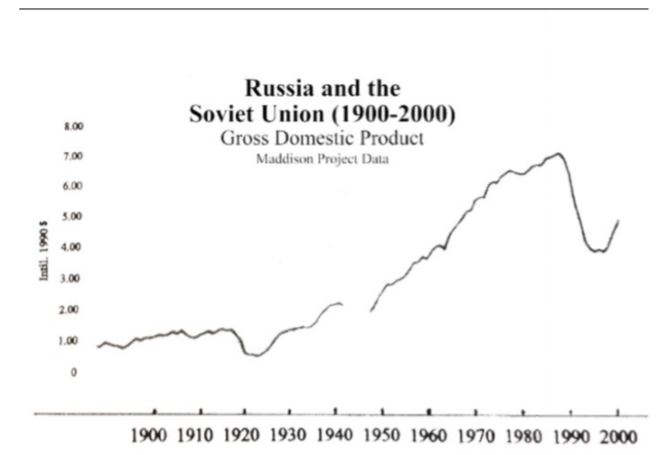
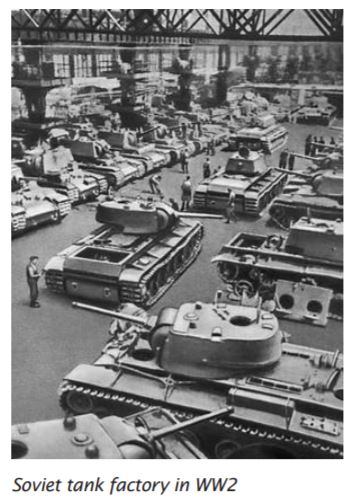
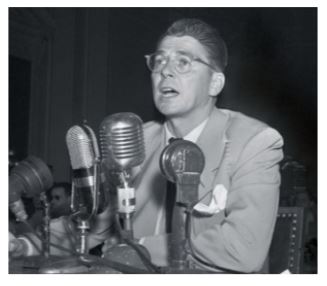
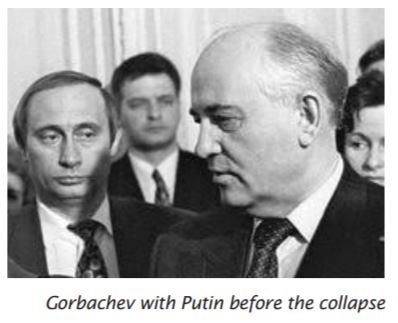

Spread the word